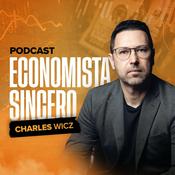560 episódios
A solution to the problem of paying for data centre power? Unpacking AWS’s recent 3 gigawatt deal with NIPSCO
17/2/2026 | 41minData centres have become one of the most contentious issue in US power markets. The question of who will pay for the new generation and grid upgrades needed to keep them running has been soaring up the political agenda, and attracting attention in the White House.
Host Ed Crooks is joined on this episode by Brandon Oyer, Head of Americas Power & Water at Amazon Web Services (AWS), and Vince Parisi, President & COO at NIPSCO, the Northern Indiana Public Service Company, to discuss a solution.
Together, they unpack their new agreement to develop power capacity in northern Indiana, which they say will enable AWS to add 2.4 gigawatts of data centre capacity without sticking everyone else with the bill.
Data centres are not just for AI: they are the “invisible digital backbone” behind everything from banking to healthcare to emergency services, Brandon says. But he also acknowledges that local communities around data centre developments are right to ask hard questions about costs. NIPSCO and other utilities agree. Vince says they welcome the economic activity and tax revenues that new data centres bring, but the goal for the electricity system is to ensure customers “aren’t paying for it.”
AWS and NIPSCO say their agreement, which they announced last November, will achieve that goal. In fact, they expect to save customers money, unlocking $1 billion in customer savings over 15 years.
So what actually makes this deal different, and is it a template others can copy? Brandon and Vince walk through the ring-fenced structure (a separate GenCo that funds and builds generation), the performance incentives, and why both sides landed on a 15-year commitment even as data-centre hardware cycles every few years. You’ll also hear why AWS doesn’t see its data centres as truly flexible loads, how the GenCo model let NIPSCO lock in long-lead equipment early, and what plugging this capacity into the MISO power market means for the reliability of electricity supplies.
See Privacy Policy at https://art19.com/privacy and California Privacy Notice at https://art19.com/privacy#do-not-sell-my-info.Energy storage steps up: the growing role of batteries on the grid, and the challenge from winter storms
10/2/2026 | 1h 1minIt’s the hottest sector in the global energy industry right now, driven by rising power demand, the need to back up variable renewable generation, and escalating threats to grid resilience. It is of course, battery storage. Host Ed Crooks and regular guest Amy Myers Jaffe speak with Julian Nebreda, CEO of energy storage systems company Fluence, about why batteries are becoming essential grid infrastructure.
At peak hours during the bitterly cold weather that has covered much of North America in recent weeks, batteries accounted for about 1% of US power supply. But even a relatively small share of battery capacity can play an outsized role in preventing outages, Julian says. He argues that batteries are best understood not as replacements for fossil fuels, but as system optimisers: delivering fast-response capacity, stabilising grids and allowing generation assets to run more efficiently. With Amy and Ed, he addresses some of the common myths around batteries’ cold-weather performance, multi-peak demand days and reliability compared with traditional generation.
The gang explores the next wave of demand growth for batteries, particularly from new data centres for AI. Julian points to “speed to power” as a major new driver for storage deployment, as the hyperscalers and other tech companies try to bring new data centre capacity online as quickly as they can. Their discussion also covers the geopolitical significance of storage, the attempt to build a battery supply chain in the US, the strengths of distributed versus centralised system designs and examples of operations from Texas to Ukraine. As Amy notes, the industry is still catching up to the full potential of storage, but the potential is enormous.
Let us know what you think. We’re on X, at @theenergygang and Bluesky, at @theenergygang.bsky.social.
See Privacy Policy at https://art19.com/privacy and California Privacy Notice at https://art19.com/privacy#do-not-sell-my-info.How a Texas electric co-op rebuilt for reliability | Sponsored content from Rayburn Electric
27/1/2026 | 45minAs Texas battles another bout of bitterly cold weather, Energy Gang looks at the lessons that one generation and transmission electric co-operative learned from Winter Storm Uri in 2021. The freeze and subsequent shock to energy prices showed providers how dangerous it can be to rely on the market alone.
For Rayburn Electric, a not-for-profit, member-owned cooperative, incurring years of power costs in just days was a catalyst for a fundamental reset of its approach to risk and resilience.
Host Ed Crooks is joined by Rayburn’s President & CEO David Naylor, and General Counsel Chris Anderson, to hear the story of how they rethought how the co-op could best serve its members, and implemented its new strategy. The crucial steps included a first-of-its-kind securitization for a co-op, to spread costs over decades, and a strategic pivot toward owning generation as a natural hedge for its electricity sales. The co-op bought a power plant, now called the Rayburn Energy Station, and has RES 2 in the works, to meet reliability needs amid rapid load growth. David and Chris share what changedinside the organization too, driven by the principle that ‘status quo is not company policy.’
Operating exclusively within ERCOT, Rayburn provides power to approximately 625,000 Texans across sixteen counties, working collaboratively with four local distribution co-ops. Its infrastructure includes more than 265 miles of transmission lines and more than 1,000 MW of owned generation capacity, including the Rayburn Energy Station, a combined-cycle natural gas plant added to strengthen reliability after Winter Storm Uri.
See Privacy Policy at https://art19.com/privacy and California Privacy Notice at https://art19.com/privacy#do-not-sell-my-info.- The new year has only just begun, and already we have seen an event with massive significance for the world of energy. The US operation to remove Venezuelan President Nicolás Maduro opens a new era for a country that holds – according to some definitions – the world’s largest oil reserves.
So far there has been little impact on oil markets. But what are the implications going to be for energy in the months and years to come? To discuss how this volatile situation might evolve, host Ed Crooks is joined by regular guest Amy Myers Jaffe, Director of NYU’s Energy, Climate Justice and Sustainability Lab, and an expert on oil earlier in her career.
History never repeats itself, the saying goes, but sometimes it rhymes. Amy draws a parallel between Venezuela today, and Iraq after the US-led invasion and the overthrow of Saddam Hussein in 2003. There are some similarities in the position of the two oil-rich countries, which were both dragged down by mismanagement and sanctions. But Amy argues that Venezuela’s oil system is in far worse shape, with looted equipment, chronic power and fuel shortages, and damage that may not be reversible.
Melissa Lott, another Energy Gang regular, also joins the show, and raises the question of what regime change in Venezuela might mean for the energy transition. Melissa is a partner at Microsoft, but appearing on the show in her usual role as an independent commentator and energy expert.
Then it’s on to the other places, people and technologies that are likely to make a big impact on energy this year. Ed is watching the Gulf Coast buildout of new liquefied natural gas (LNG) plants. It is a boom so big that Wood Mackenzie expects US LNG exports to roughly double from 2023 levels by around 2030, with more growth beyond.
The gang assesses the likely consequences of surging LNG supplies: downward pressure on global gas prices, and potential financial strain for exporters. There is also the possibility that a peace deal in Ukraine could make the oversupply even worse, by allowing more Russian gas to flow west into European markets.
Next up, it’s people to watch in 2026. Melissa names the US energy secretary Chris Wright, and Ed picks new FERC chairman Laura Swett. As the US power grid, and its energy system more generally, face mounting challenges because of the growth in data centers needed for AI, effective policy and regulation will be critical. Amy chooses China’s President Xi Jinping: the country’s next five-year plan could reshape the global competition for energy dominance.
On technologies to watch, battery storage is a hot topic. Melissa and Ed discuss the supply chains needed to meet growing demand, and innovative products such as Form Energy’s iron-air batteries, which are being deployed in a first-ever commercial project that will be fully operational this year. Amy’s choice is humanoid robots. They’re expensive and still imperfect, but are they going to rule the future? They are already being trialled for repetitive factory tasks. Amy says her Roomba can’t cope with a spilt bowl of cereal. But will new flexible AI-guided robots be able to do the job properly?
Follow the show so you don’t miss an episode this year – it’s going to be a busy one.
See Privacy Policy at https://art19.com/privacy and California Privacy Notice at https://art19.com/privacy#do-not-sell-my-info. Electric vehicles create problems for the grid. Could they also help solve them? The plan to turn EVs into reliable grid infrastructure
06/1/2026 | 54minAs we head into 2026, electricity grids aren’t just under strain; they are facing transformational change because of the shifts in the ways that we work, entertain ourselves, and get around. EVs are one of the fastest-growing new loads on the grid in many parts of the world, but are also one of the least well-understood. They can exhibit flexibility that’s mostly going unused today. Millions of EVs are already connected to the grid, and they’re being treated as a problem instead of a solution. So how could they be used to ease that strain on electricity grids? What would it look like if we could turn EVs into really useful distributed energy resources (DERs)?
Host Ed Crooks welcomes Apoorv Bhargava to the show for the first time. Apoorv is the CEO and co-founder of WeaveGrid, a company aiming to make EVs and other DERs function like dependable infrastructure for distribution grids. It wants provide utilities with trusted, repeatable, edge-level control of assets, rather than occasional, system-level demand response. Apoorv explains how it all works.
Apoorv is a former student of regular guest Amy Myers Jaffe, who now teaches at New York University. She joins the show to argue that there is still a great deal of uncertainty around claims of using flexibility to reinforce. It isn’t a black-and-white question, she says: flexibility only works when it’s engineered, trusted and planned for at the distribution level, not improvised through emergency demand response.
Together Ed, Apoorv and Amy debate how EVs and grids might be able to work together in the future, instead of against each other. They discuss consumer behaviour, politics and concerns over rising power bills as factors that will matter just as much as the evolution of the technology. The biggest grid upgrade opportunity may not be new wires, transformers or even power plants: it could be the Tesla, VW or BYD in your driveway.
See Privacy Policy at https://art19.com/privacy and California Privacy Notice at https://art19.com/privacy#do-not-sell-my-info.
Mais podcasts de Negócios
Podcasts em tendência em Negócios
Sobre Energy Gang
Covering breaking news in clean tech, going deep on global energy policy, and debating the levers that need to move to accelerate the energy transition. Energy Gang is the podcast covering clean energy technology, renewable energy, and the environment. The world of clean energy moves fast, and you need a reliable source to stay on top of the news that matters. You’ll find it on Wood Mackenzie’s Energy Gang.How will changes to the US government affect decarbonisation and energy security? When will hydrogen, nuclear and carbon capture deploy at scale? Where’s the money for the energy transition green finance coming from and how much more is needed? What’s the outlook for EVs? What are the energy predictions for solar energy? What's the latest on climate change?Get answers to questions like these, bi-weekly on Tuesdays at 7am ET. Plus, get special live episodes recorded at the biggest climate and energy events throughout the year, like COP30 and Climate Week NYC. Don’t worry if you can’t make it in person, Energy Gang brings you all the updates on energy policy, energy finance and energy innovation you need to hear.Energy Gang is presented by Wood Mackenzie and hosted by Ed Crooks, Vice-Chairman of Energy at Wood Mackenzie and a former Financial Times and BBC News journalist. Regular guests are Amy Myers-Jaffe (Director of NYU’s Energy, Climate Justice and Sustainability Lab), and Dr Melissa Lott (Partner at Microsoft) – plus a roster of industry leaders and policy influencers, like Jigar Shah (Industry figurehead and former director of the Loan Programs Office in the US Department of Energy), Caroline Golin (Head of North America, Global Energy Market Development and Policy at Google) and Ambassador Geoffrey Pyatt (Former Assistant Secretary of State for Energy Resources).If you like The Energy Transition Show, Catalyst with Shayle Kann, The Big Switch from Columbia University, Open Circuit with Stephen Lacey or The Green Blueprint, you’ll enjoy Energy Gang.Want to get involved with the show? Reach out to [email protected] to:Bring Energy Gang to your eventBe a guest on the showSponsor an episodeAsk a question to Ed Crooks or one of our guestsCheck out another leading clean tech global podcast by Wood Mackenzie, Interchange Recharged: https://www.woodmac.com/podcasts/the-interchange-recharged/Wood Mackenzie is the leading global data and analytics solutions provider for renewables, energy and natural resources. Learn more about Wood Mackenzie on the official website: https://www.woodmac.com/
Site de podcastOuça Energy Gang, Economia e muitos outros podcasts de todo o mundo com o aplicativo o radio.net

Obtenha o aplicativo gratuito radio.net
- Guardar rádios e podcasts favoritos
- Transmissão via Wi-Fi ou Bluetooth
- Carplay & Android Audo compatìvel
- E ainda mais funções
Obtenha o aplicativo gratuito radio.net
- Guardar rádios e podcasts favoritos
- Transmissão via Wi-Fi ou Bluetooth
- Carplay & Android Audo compatìvel
- E ainda mais funções


Energy Gang
Leia o código,
baixe o aplicativo,
ouça.
baixe o aplicativo,
ouça.








































